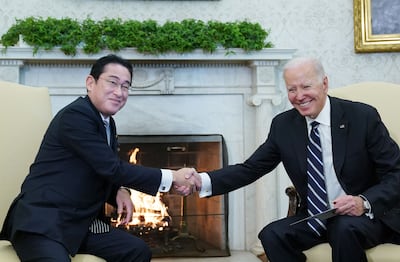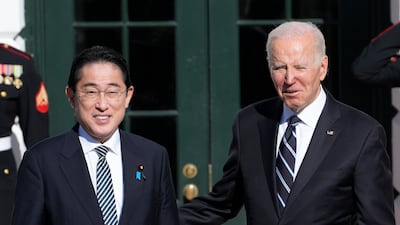US President Joe Biden welcomed Japanese Prime Minister Fumio Kishida to the White House on Friday, celebrating “a remarkable moment” in the Washington-Tokyo alliance, as Japan continues an unprecedented military build-up.
“I don't think there's ever been a time where we were closer to Japan in the United States,” Mr Biden said before the bilateral meeting.
Mr Kishida told Mr Biden in the Oval Office: “Japan and the United States are currently facing the most challenging and complex security environment in recent history.”
“The role that we are to play [in the world] is becoming even greater,” the Japanese Prime Minister said.
Japan's role as a major diplomatic player on a range of global issues is at a key moment.
Tokyo has been working towards carrying out its biggest military build-up since the Second World War, unveiling a $320 billion plan last month that includes the purchase of missiles with the ability to strike China.
The sweeping new plan will place a historically pacifist Japan among the world's top defence spenders — behind only the US and China.

Spearheaded under Mr Kishida, the new defence budget will double Tokyo's military spending to about 2 per cent of the country's entire gross domestic product over five years.
In a joint statement following the afternoon's discussions, the US President praised Japan's recent overhaul of its defence budget as well as the close ties between the two countries.
“President Biden reiterated the unwavering commitment of the United States to the defence of Japan under Article V of the Treaty of Mutual Co-operation and Security, using its full range of capabilities, including nuclear,” the joint statement read.
The Treaty of Mutual Co-operation and Security allows for the presence of American military bases in Japan and commits the two countries to a policy of mutual defence.
“Together, we have aligned our collective force posture and deterrence capabilities to meet new and emerging threats, including in the cyber and space domains,” the statement added.
While Washington warmly welcomed Mr Kishida's boosted defence strategy, the Japanese leader faces scepticism at home, with the National Diet set to begin debate soon over how to pay for the new defence budget.
Earlier this week, the US and Japan announced enhanced co-operation after meetings between the respective countries' defence and diplomatic officials.
China's military exercises in Taiwan Strait attract tourists — video
The countries announced an upgrade in US posture in Japan amid “a severely contested environment” that will include “positioning more versatile, resilient and mobile forces with increased intelligence, surveillance and reconnaissance, anti-ship and transportation capabilities”.
Japan hosts about 18,000 US marines, the biggest concentration outside the US, and about 54,000 American troops in total, Reuters reported.
White House National Security Council spokesman John Kirby said on Thursday that those upgrades “will allow the United States and Japan together to provide for peace and security in the Indo-Pacific region and bolster deterrence in the region and globally”.
“We agree that [China] is the greatest shared strategic challenge that we and our allies and partners face,” US Secretary of State Antony Blinken told a joint news conference after the Wednesday meeting.
US Secretary of Defence Lloyd Austin added that Washington “strongly endorsed” Tokyo's acquiring of a counterstroke capability against Beijing, as tension in the Indo-Pacific rise over Taiwan.
The allies had a bilateral meeting in the Oval Office on Friday as well as a White House working lunch.
Mr Kirby added on Thursday the agenda will be a “full one”.
In a statement announcing Mr Kishida's visit, White House Press Secretary Karine Jean-Pierre said the leaders would also “discuss a range of regional and global issues”, including North Korea's weapons of mass destruction and ballistic missile programmes, Russia’s war in Ukraine, and maintaining peace and stability across the Taiwan Strait.
Japan recently assumed the Group of Seven presidency before the G7 summit in Hiroshima in May, as well as commencing its two-year stint on the UN Security Council as a nonpermanent member.
During their bilateral talks on Friday, Mr Biden and Mr Kashima discussed priorities for the G7 Hiroshima Summit, and vowed to “continue to work closely towards a successful summit so as to demonstrate the G7’s commitment to upholding the international order based on the rule of law”.
Following the bilateral White House Meeting, Mr Kishida is due to visit Nasa along with Mr Blinken “for an event marking our nations' continued commitment to the peaceful exploration of space”.
Mr Blinken and Japan's Foreign Minister Yoshimasa Hayashi are expected to sign an agreement “that will build on decades of bilateral co-operation in the exploration and use of outer space for peaceful purposes and that underscores the commitment of the United States and Japan to safe and responsible outer space activities in Earth’s orbit, at the Moon and beyond”.
“From our perspective, the message is absolutely clear: Japan is stepping up and doing — doing so in lockstep with the United States,” said Mr Kirby.
After the meeting, Mr Biden will travel to his Delaware home for the holiday weekend.


